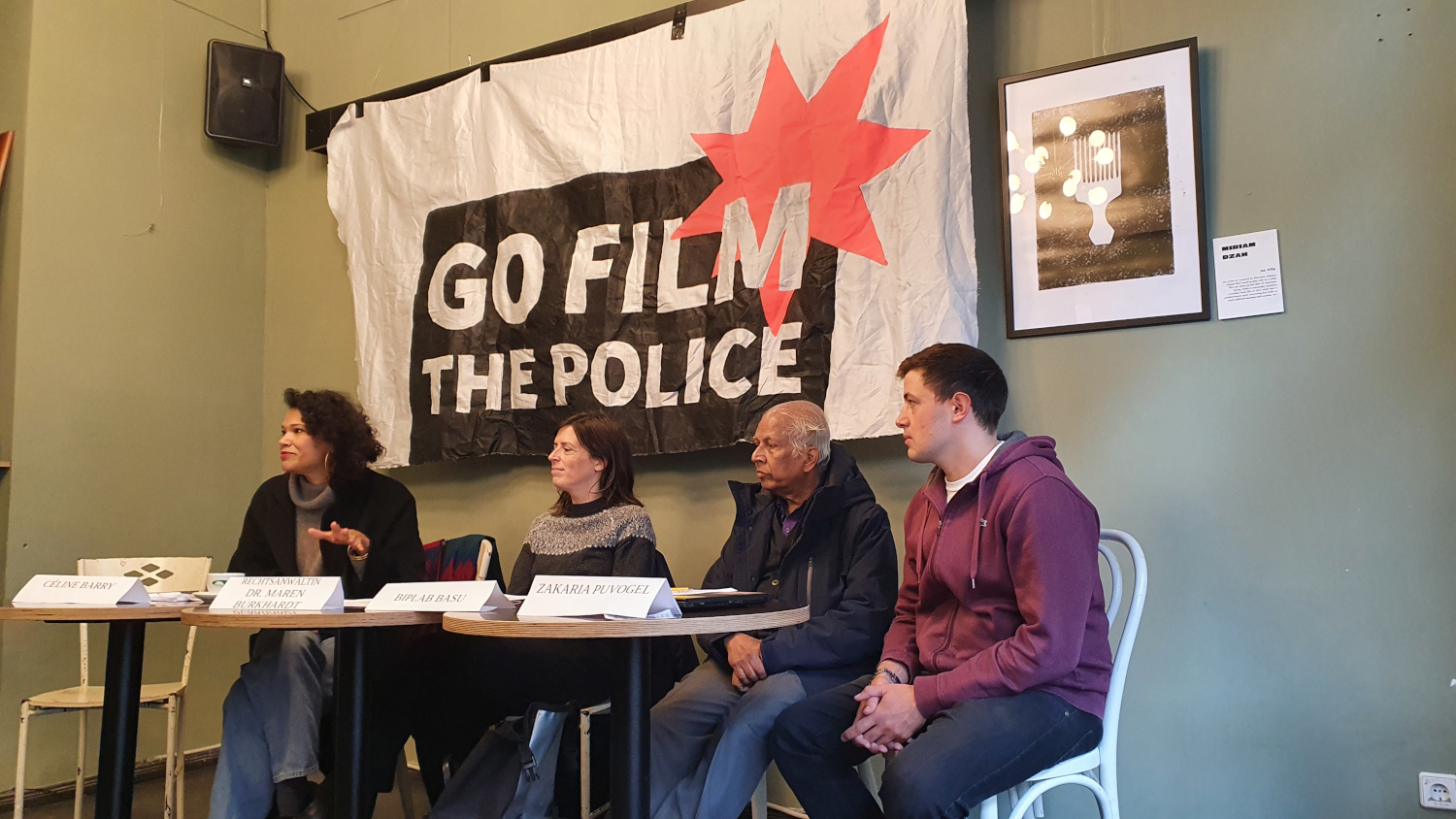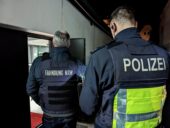Interview with Maren Burkhardt
The German Campaign for Victims of Racist Police Violence (Kampagne für Opfer rassistischer Polizeigewalt, KOP) calls for documenting police actions with video footage. Initially, the police defended themselves against this with the Art Copyright Act, now the police often describes its spoken word as “non-public”. I spoke about this with Maren Burkhardt, who represented and supported the campaign as a lawyer.
For years, police authorities have tried to hinder the filming of operations. The prohibitions imposed in this context have gained a new variant in the form of § 201 of the Criminal Code (StGB). The section protects the confidentiality of the spoken word. Would it be permissible to film police operations, but not to record them with a microphone?
§ Section 201 of the Criminal Code serves to protect the right to preserve the impartiality of the non-publicly spoken word. Accordingly, the provision only refers to the oral voice. The wording of the provision is therefore clearly not directed at the visual recording of persons. Filming without sound is therefore not punishable under section 201 of the Criminal Code.
This means that if the sound is switched off during the recording, the filmmakers have nothing to fear?
There is a separate penal provision for the visual recording of persons, § 201a StGB. According to Section 201a of the Criminal Code, it is a punishable offence to take pictures of a person in his or her private home without his or her consent, but also to take pictures that show the helplessness of a person. § Section 201a of the Criminal Code, however, does not criminalise filming in public. This again clearly shows that the legislator deliberately did not enact a general punishability for filming in public.
Several district and regional courts have already dealt with the applicability of Section 201 of the Criminal Code and have ruled differently. Could a common tenor be discerned from this?
The previous case law almost exclusively referred to the situation where filming of police actions took place in the presence of third parties. Under the heading of “de facto publicity”, the majority of regional courts – such as the Kassel Regional Court, the Essen Regional Court and the Cologne Regional Court – have ruled that de facto publicity has been established, at least insofar as third parties are present and can perceive the statements without much effort, and thus criminal liability under section 201 of the Criminal Code does not apply.
Only the Regional Court of Munich has ruled in a comparable situation that even in the case of such “de facto publicity” there can be criminal liability under section 201 of the Criminal Code.
In summary: So if no one else overhears the exchange of words between the police and the person in a police measure, should this measure also not be allowed to be recorded?
So far, only a few courts have ruled on the question of whether criminal liability can also be considered if statements by the police are filmed in public, but no third persons are in the vicinity at that moment.
Only the Regional Court of Aachen has interpreted the de facto publicity in a decision in such a way that it should not depend on whether a third person was actually listening in, but that it should be sufficient if the person making the statement “cannot ensure under the objectively given circumstances that his or her statement will not be perceived by surrounding participants or passers-by”. And the Osnabrück Regional Court has ruled that for the question of publicity it does not depend on whether third parties are in the vicinity, but that it is sufficient that the statements are made in a place freely accessible to the public.
So there is no uniform line so far?
In summary, it can be said that the Munich Regional Court stands alone in its opinion that § 201 StGB can nevertheless be realised if third parties are actually present. The situation of the existence of a de facto public in the sense that third parties were present in the close vicinity while filming and could hear the statements has otherwise been assessed as “public” by all district courts. But the question of how to assess the situation when third parties were not actually listening has so far been assessed differently by the courts that have included the question; most courts have not dealt with this question at all.
An interesting question is whether filming can be justified in some cases. Here, too, a clear tendency is not yet apparent, as most courts have not dealt with this question. Depending on the case constellation, different reasons can be considered for justification – for example, in the case of identity checks, the consent of the person being checked. According to the Regional Court of Kassel, such consent would be a justification, which would therefore render the offence inapplicable.
Another justification could be a so-called justifiable state of necessity. In this case, the legal interest protected by criminal law is weighed against another endangered legal interest. The Regional Court of Frankenthal has stated that a justification may exist if unlawful police action is filmed. The right to film an unlawful act for evidence purposes would then be weighed more highly than the police officers’ right to confidentiality of the word.
Does it make a difference when filming if it is a purely official conversation, if police officers are withdrawing for a briefing or if they are filmed inside a police vehicle?
The Munich Regional Court has argued that official talks are to be classified as non-public, as they are not addressed to the general public and thus may not be recorded. However, this has not been held by other courts so far. Conversely, it is argued – even by a lecturer at a police academy – that police actions and thus also official conversations are and must be geared towards controllability. Police actions can also be challenged before the administrative courts. However, they are not subject to the protection of section 201 of the Criminal Code.
In the case of an official car, the question will certainly arise sooner or later as to whether it is a “space particularly protected against inspection”. Section 201a of the Criminal Code treats this as equivalent to a dwelling. However, filming in such a room would only be punishable if it violated the officers’ most personal sphere of life. This brings us to a debate similar to the one on official interviews.
Now, for the first time, a Higher Regional Court (OLG) has ruled on the matter in Zweibrücken and strictly interpreted § 201 StGB in the case heard. What was the case about?
There was no “de facto public” in the facts of the case that the Zweibrücken Higher Regional Court had to decide on. There were 15 to 20 people at the scene of the incident. However, all of them were affected by the police measures and their personal details were checked. Accordingly, they were all addressees of the “spoken word” and thus not the public – according to the police’s construction. The checks took place at night and, according to the court’s findings, in a spatially delimited area in which it was not to be expected that other persons beyond the group of persons checked were listening.
The very broad interpretation of the Regional Court of Munich, that even in the presence of third persons there can be criminal liability due to violation of the confidentiality of the word, was thus not confirmed by the Higher Regional Court of Zweibrücken. It only ruled on the case that outsiders were not present and stated that in this case, criminal liability under section 201 of the Criminal Code could be considered, even if the incident took place in the public sphere.
The parties involved in the incident could have imagined themselves alone, thus their conversation was “non-public”, the judgement says. What do you make of this?
This rejects the view that the only thing that matters is that a place is open to the public. I consider this interpretation to be wrong. Police activity in public cannot be considered a private matter and must be open to monitoring. The necessary possibility of monitoring police actions in public space is now even considered permissible by police law in some federal states through body cams.
On the one hand, this means that monitoring and the preservation of evidence are considered necessary. On the other hand, this must not be placed unilaterally in the hands of the authority that is to be monitored.
The subsidiary paragraph § 201a StGB states that filming is only punishable if it takes place in specially protected rooms, such as a home. So it doesn’t really make sense that this should be even more prohibited in public?
Section 201a of the Criminal Code is not actually a secondary paragraph. The “a” is only due to the fact that it was inserted into the law later than § 201 StGB. It is true that § 201 StGB provides for a somewhat broader range of punishment than § 201a StGB. However, in practice this will only have an effect in individual cases, as we will often have to deal with fines for these offences, especially for first offences. The decisive point for me remains the question of whether the legislator meant filming police officers at all with Section 201 of the Criminal Code. But that is precisely not the case.
If you look at the ruling from Zweibrücken in detail, there are still some points open…
The decision of the Higher Regional Court of Zweibrücken leaves open the question of whether, in the case of unlawful actions by the police, there is a justification for filming. The judges did not see any evidence of unlawful police action, so there was no need for evidence. I consider this assessment to be unrealistic.
As a layperson, it is hardly possible to recognise on the spot the moment when police action becomes unlawful. Even for courts, it is often only possible to judge this in retrospect and after extensive consultation. In this respect, the precautionary preservation of evidence on the spot should be in the foreground.
Also, when a spoken word is to be considered non-public “has not yet been conclusively clarified”, is a central sentence of the Higher Regional Court ruling. Where is this to be clarified?
That is a good question. First of all, the court is really only saying that it does not want to deal with this question and actually cannot do so if it assumes that there simply was no public in the case at hand. A clarification could be brought about by another Higher Regional Court if it were presented with a corresponding case constellation. This would then also be a directional decision for other courts. If, for example, another Higher Regional Court then again had a different opinion on the decided question, then it would have to submit the question to the Federal Supreme Court for a decision.
The police often react to filming by confiscating the mobile phone or camera. How is this legally justified in practice?
On the one hand, this can be argued in terms of police law, i.e. in the direction of so-called danger prevention. This is often done. It is then said that the filming hindered police action. Although such a preventive police measure does not result in a penalty, it does effectively prevent further filming and the preservation of evidence.
Otherwise, if there is a suspicion of a criminal offence, a seizure can be carried out for the purpose of preserving evidence. The question then arises again whether there is a suspicion of a criminal offence because of the filming of the police officers. In addition, some other conditions must be met for the seizure to be lawful.
What are these?
If the object is not surrendered voluntarily, a formal seizure is required. In addition to a suspicion of a criminal offence, a formal seizure usually requires an order by a judge. Exceptionally, in cases of “imminent danger”, the public prosecutor’s office or its investigators, i.e. primarily the police, may also order the seizure. The question of how far “imminent danger” is to be interpreted is always a matter of dispute. The seizure must be in accordance with the principle of proportionality. The extent of the seizure must therefore be in proportion to the seriousness of the offence and the strength of the suspicion.
Conversely, when are the police allowed to film those affected by an operation?
The police need a legal basis for filming people. Such a legal basis can arise either from the Code of Criminal Procedure, the Police Act or the Assembly Act. For the prosecution of criminal offences, filming is only allowed if there is a suspicion of a criminal offence; as a rule, only the accused may be filmed. Under police law, i.e. for the purpose of averting danger, filming is allowed, for example, when carrying out measures to avert danger, but only if there are actual indications that this is necessary to protect the police officers.
Filming may also be carried out at meetings or gatherings if the police have indications that criminal offences could be committed. However, filming may not be continuous. The police are not allowed to film for other purposes without a legal basis. For example, there are decisions that the police are not allowed to film and publish for their own public relations work.
You represented and supported the Berlin Campaign for Victims of Racist Police Violence in the campaign “Go film the police” as a lawyer. In this, the filming of police actions is offensively pushed. As far as I know, the campaign existed before the now common practice of using § 201 StGB. How were the bans justified before?
At first, the police argued with the Art Copyright Act and the police officers’ right to their image. However, the Art Copyright Act does not make the taking of photographs a punishable offence. Sections 22 and 33 only criminalise the distribution or public display of images without the consent of the person depicted.
In the past, it was often argued in favour of preventing filming by police measures that the images were taken for the purpose of publication, without this being clear at the time. However, after a decision by the Federal Constitutional Court in 2015, this was no longer possible. In this decision, the court stated that police measures cannot be justified by the mere possibility of (future) criminal liability.
Filming by the police strengthens the grievance power of affected persons, but can also be used against affected persons by a police-friendly judiciary – what is your advice on how to deal with such ambivalences?
As far as film material is available, it should not be hastily given out of hand or even published. It is important to look at each case constellation carefully. If there are already criminal proceedings against the person filming or another person, then the first step should always be to inspect the files of these proceedings with the help of a lawyer, so that a tactical decision can then be made calmly.
If a case is to be brought against the police, it is also advisable not to file charges prematurely. There are a number of things to bear in mind and, last but not least, there is also the risk that the police in turn will react with proceedings or have already initiated proceedings. The police have some advantages in such proceedings. For example, police officers are more likely to be believed in criminal proceedings than other people, and their credibility is difficult to shake. In addition, as witnesses they have access to the police files, which is a considerable advantage.
“Go film the police” is not an end in itself – how can the film recordings be used later in political work?
I first see the use against the background of my field of work as a lawyer. I have already experienced a large number of proceedings with police officers as witnesses or as defendants. These are difficult proceedings, and films are simply one of the few ways to counter the statements of these professional witnesses.
Processes in which such things can be made a topic of discussion also have to reach the public perception and be discussed. There is often a lack of awareness of how the police act in some situations and that courts do not prosecute unlawful police behaviour. This is where political work has to start.
Thank you for the interview!
Image: Celine Barry, Maren Burkhardt, Biplab Basu and Zakaria Puvogel at the presentation of the campaign (AAS/ Belltower News).





Leave a Reply